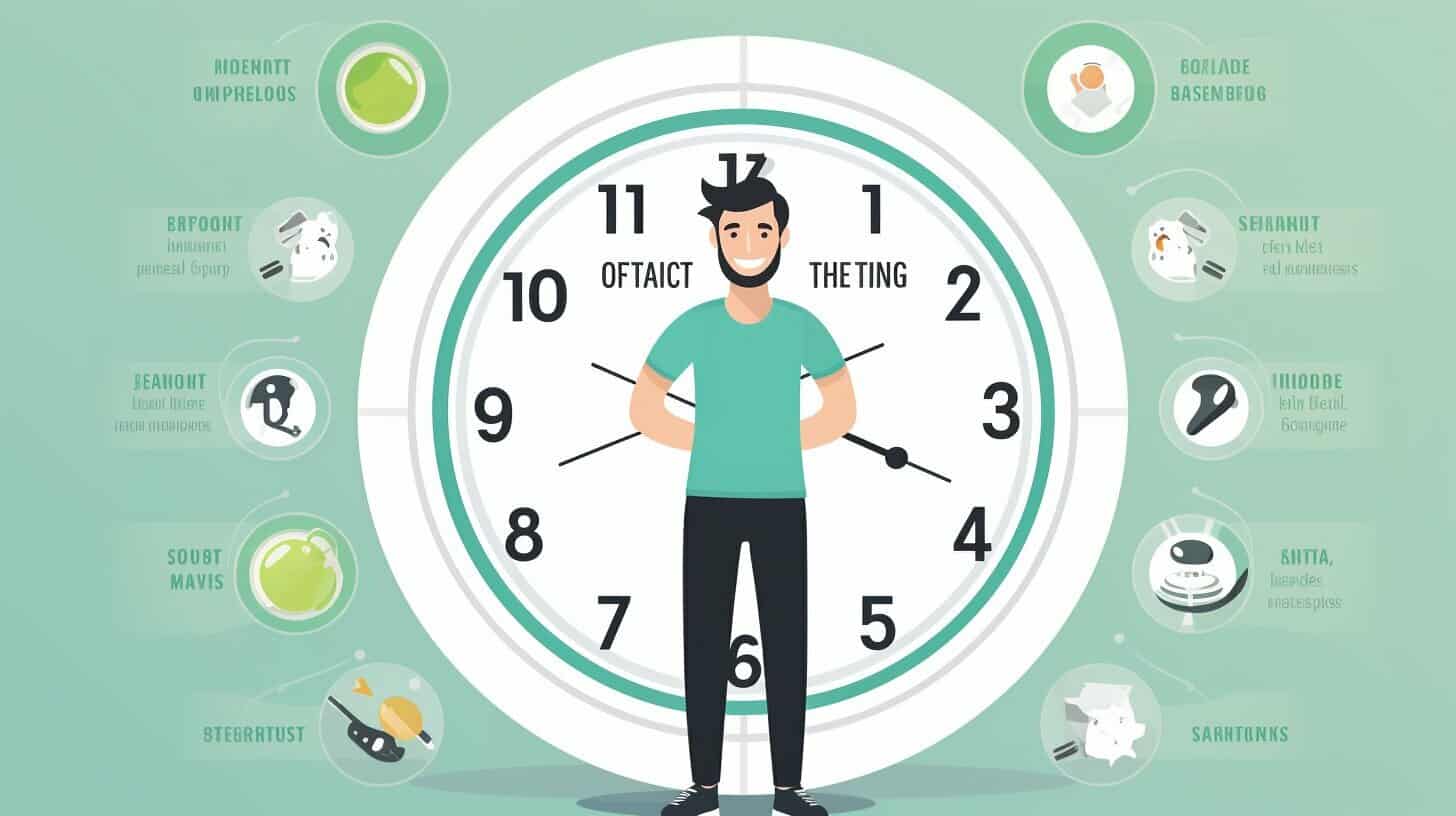Have you ever wondered why some days seem more productive than others? Or why you feel more energized at certain times of the day? It all comes down to timing. Optimizing your daily routine by identifying the best time to do everything can lead to improved productivity, better mood, and overall success.
Timing is crucial in our daily lives. Knowing when to perform specific tasks can make all the difference in achieving our goals and being efficient with our time. Whether it’s exercising, working on creative projects, tackling challenging tasks, or doing mundane chores, doing them at the right time can maximize their impact.
Key Takeaways:
- Timing is essential for maximizing productivity, happiness, and success in our daily lives
- Identifying the optimal time to perform specific tasks can lead to improved efficiency and overall well-being
Understanding the Importance of Efficient Scheduling
As a professional journalist, I’ve learned that efficient scheduling and time management are essential skills in optimizing productivity and achieving success. While we all have the same 24 hours in a day, how we use that time can make all the difference. By implementing effective scheduling techniques, we can make the most of our time and reduce stress.
One of the keys to efficient scheduling is prioritization. By determining which tasks are most important and allocating time accordingly, we can ensure that we are focusing on the right things at the right time. It’s also important to avoid multitasking, which can reduce productivity and lead to burnout. Instead, try focusing on one task at a time and give it your full attention.
Another helpful technique is time blocking. This involves dividing your day into specific time slots dedicated to certain tasks, such as checking email, completing projects, and attending meetings. This helps to create structure and reduce distractions, improving efficiency and productivity.
Finally, it’s important to regularly evaluate and adjust your schedule as necessary. Life is full of unexpected events and circumstances, and having a flexible schedule can help you adapt and stay on track. By finding a rhythm and routine that works for you, you can make the most of your time and achieve your goals.
Identifying the Optimal Timeframes for Daily Tasks
When it comes to daily tasks, timing can make a significant difference in our productivity and overall success. By understanding when to perform specific activities, we can maximize our efficiency and achieve our goals more effectively. Here are some insights into identifying the optimal timeframes for common daily tasks:
Exercising
Exercising can be beneficial at any time of the day, but the timing can depend on your goals and preferences. For weight loss, working out in the morning can help jumpstart your metabolism and set a healthy tone for the day. For performance, late afternoon or early evening may be the best time when the body is most warmed up and alert. Regardless of the time, consistency is key.
Working on Creative Projects
For those who engage in creative work, the best time can vary depending on individual biorhythms. Some people find that creativity flows better in the morning when the mind is fresh and uncluttered, while others may prefer working during quiet hours in the evening. It’s important to find the time that works best for you and stick to it.
Tackling Challenging Tasks
When confronting challenging or complex tasks, it’s best to schedule them during your peak performance hours. These are times when you feel most alert and focused, and can vary from person to person. For some, this may be in the morning, while for others it could be in the afternoon or evening.
Mundane Chores
Household chores can be tedious but necessary. To make the most of these tasks, try to schedule them during low-energy periods in your day. This could be after lunch, for instance, when the body may be experiencing a post-meal lull. Alternatively, turn these activities into opportunities for mindfulness or restorative breaks.

Time Hacks for Optimal Results
When it comes to time management, it’s not just about getting things done, but getting them done efficiently. Here are some time hacks that I use to achieve optimal results:
1. Prioritize Tasks
Start your day by prioritizing tasks that need to be accomplished. Create a list of tasks and arrange them in order of importance. This will help you tackle the most critical tasks first and avoid getting bogged down by less important ones.
2. Time Blocking
Group similar tasks together and schedule them in specific time slots. For example, set aside a block of time for answering emails, another for making phone calls, and so on. This helps you stay focused and avoid distractions.
3. Use Technology
There are plenty of tools available to help you manage your time efficiently. Use scheduling apps, timers, and alarms to stay on track and motivated.
4. Take Breaks
Don’t underestimate the power of taking breaks. Regular breaks can help you stay refreshed and focused. Take a quick walk, meditate, or simply take a few deep breaths to recharge your mind and body.
5. Eliminate Distractions
It’s important to eliminate distractions when working on important tasks. Turn off notifications on your phone and email, close unnecessary tabs on your browser, and find a quiet space to work.
6. Delegate Tasks
Don’t be afraid to delegate tasks to others if possible. This can free up your time and allow you to focus on more critical tasks.
By incorporating these time hacks into your daily routine, you can improve productivity and achieve optimal results.
The Best Times for Activities
When it comes to getting things done, timing is everything. By aligning your daily routine with your natural energy levels, you can maximize productivity and achieve better results. Here are some activities and their best times:
- Waking up: Ideally, wake up early in the morning, around 6 – 7 AM for a fresh start.
- Meal times: Breakfast is best eaten in the morning, while lunch should be consumed during mid-day, around 1 – 2 PM, when you’re most alert. Dinner should be eaten at least three hours before bed to aid in digestion and prevent sleep disruptions.
- Meetings: Late morning is an ideal time for meetings as people are more alert and focused. Avoid scheduling meetings after lunch when energy levels are likely to dip.
- Creative work: For creative work, the best time is during your peak performance hours, which are usually in the morning for most people.
- Relaxation: Schedule some time for relaxation during the afternoon slump, around 2 – 3 PM, to recharge and avoid burnout.
By incorporating these optimal timeframes into your daily schedule, you can enhance your overall productivity and improve the quality of your work.

Efficient Time Allocation for Maximum Productivity
As I mentioned earlier, time management is crucial to maximizing productivity and getting things done efficiently. But efficient time management is not just about scheduling tasks and activities at specific times of the day; it’s also about allocating time effectively to ensure that we make the most of our available resources.
One strategy for efficient time allocation is to prioritize tasks based on their importance and urgency. By identifying tasks that require immediate attention and focusing on them first, we can avoid wasting time on unimportant or low-priority tasks.
Another key aspect of efficient time allocation is minimizing distractions and interruptions. This can be achieved by scheduling specific times for checking emails or social media, or by utilizing tools such as noise-cancelling headphones to block out external noise.
Finally, maintaining focus and concentration is essential for optimal time allocation. This can be achieved by taking regular breaks to recharge and refocus, or by adopting techniques such as the Pomodoro method, which involves working in focused 25-minute intervals followed by short breaks.
The Perfect Timing for Rest and Relaxation
As important as it is to be productive and efficient, it’s equally crucial to give ourselves time to rest and recharge. Proper rest and relaxation can help prevent burnout, increase creativity, and improve overall well-being. But when is the best time to take breaks or engage in leisure activities?
Research suggests that mid-afternoon, around 2 or 3 PM, is a natural lull in our circadian rhythm, making it an ideal time for a short nap or relaxation break. Additionally, taking breaks every 90 minutes can help maintain focus and increase productivity throughout the day.
When it comes to winding down for the evening, it’s best to avoid screens and other high-stimulus activities for at least an hour before bedtime. Instead, try reading a book, taking a warm bath, or practicing relaxation techniques such as meditation or deep breathing.
Getting enough sleep is also essential for overall health and productivity. Most adults need between 7-9 hours of sleep each night to function at their best. It’s recommended to establish a consistent bedtime and wake-up time, even on weekends, to help regulate the body’s sleep-wake cycle.
Remember, rest and relaxation are just as important as productivity. By taking the time to recharge, we can improve our overall well-being and perform at our best.

Unlocking Your Peak Performance Hours
Have you ever noticed that you’re more productive and focused during certain hours of the day? These are your peak performance hours. Identifying and unlocking them can help you accomplish more in less time and with greater efficiency.
Personally, I’ve found that my peak performance hours are in the morning, between 8am and 11am. During this time, I’m able to tackle my most challenging tasks and make significant progress on my projects.
How to Identify Your Peak Performance Hours
To identify your peak performance hours, start by tracking your energy levels and productivity throughout the day. Take note of when you feel most alert, focused, and motivated. This will give you a good indication of when your peak performance hours occur.
You can also use tools like the Pomodoro Technique, which involves working for 25-minute blocks and taking short breaks in between. Notice when you’re able to complete the most work during these focused blocks of time.
How to Make the Most of Your Peak Performance Hours
Once you’ve identified your peak performance hours, it’s important to make the most of them. Here are some tips to help you do that:
- Plan your day accordingly, scheduling your most important tasks during your peak hours.
- Minimize distractions, so you can fully focus on your work.
- Tackle your most challenging tasks, as your brain is better equipped to handle them during your peak hours.
- Take breaks to avoid burnout, but try to keep them short to maintain your productivity momentum.
By unlocking your peak performance hours, you can optimize your productivity and achieve more in less time. So, take the time to identify your peak hours and adjust your schedule accordingly.
Incorporating Time Management Strategies into Your Daily Routine
Managing time effectively is essential for optimizing productivity and achieving success both in personal and professional life. Here are some practical time management strategies that I found helpful:
- Task Batching: Group similar tasks together and do them in one session. For instance, I check my emails in one go instead of responding to them as they come. This way, I save time and avoid distraction.
- Time Blocking: Create a schedule with specific time slots for different tasks and stick to it. It is beneficial to allocate time for essential tasks such as exercising, meal times, meetings, and relaxation.
- Prioritizing tasks: Identify the most important and urgent tasks and do them first. This way, there is ample time later on for other tasks that may require less attention.
- Eliminating Distractions: It is crucial to eliminate distractions to maintain focus. I try to turn off notifications on my phone and avoid checking social media when working on something important.
- Effective Scheduling: Creating a realistic daily schedule that includes everything from work duties to leisure activities is essential for efficient time management. I ensure that I have a good balance between work and personal time, which helps to minimize stress and boost productivity.
Try implementing these strategies and see how it positively impacts your daily routine. What other time management strategies have you found helpful? Let me know in the comments!
Conclusion on The Best Time To Do Everything
After delving into the science of optimal timing, it’s clear that finding the best time to do everything can have a significant impact on our daily lives. With efficient scheduling and time management strategies, we can maximize our productivity and achieve our goals while minimizing stress.
By identifying the optimal timeframes for daily tasks and activities, we can align our routines with our natural energy levels and perform at our best. Additionally, incorporating time hacks and maximizing our peak performance hours can help us accomplish more during designated time slots.
It’s important to remember that rest and relaxation also play a crucial role in maintaining overall well-being and productivity. By prioritizing adequate sleep and breaks throughout the day, we can recharge and perform at our best.
As we wrap up, I encourage you to implement the strategies and tips shared in this article to optimize your daily routine. With efficient time allocation and proper scheduling, you can achieve your goals and lead a happier, more productive life.
FAQ on The Best Time To Do Everything
Q: What is the concept of optimizing daily routines?
A: Optimizing daily routines involves identifying the best time to do everything, maximizing productivity, happiness, and success in our daily lives.
Q: Why is efficient scheduling important?
A: Efficient scheduling and time management helps us make the most of our daily tasks and activities, leading to improved productivity and less stress.
Q: How can I identify the optimal timeframes for daily tasks?
A: By understanding when to perform specific tasks throughout the day, such as exercising, working on creative projects, tackling challenging tasks, and even mundane chores, we can maximize productivity and achieve better results.
Q: What are some time hacks for optimal results?
A: Incorporating time hacks into our routines, such as prioritizing tasks, managing distractions, and maintaining focus, allows us to achieve optimal results in our personal and professional lives.
Q: What are the best times for different activities?
A: Waking up, meal times, meetings, creative work, relaxation, and other activities can be aligned with our natural energy levels for maximum effectiveness.
Q: How can I efficiently allocate my time for maximum productivity?
A: By prioritizing tasks, managing distractions, and maintaining focus, we can allocate our time efficiently throughout the day and accomplish more in designated time slots.
Q: How important is rest and relaxation?
A: Adequate rest and relaxation are crucial for overall well-being and productivity. Taking breaks, engaging in leisure activities, and ensuring sufficient sleep are essential for recharging and performing at our best.
Q: How can I unlock my peak performance hours?
A: Identifying our most productive and focused periods, known as peak performance hours, and leveraging them to tackle important tasks can lead to optimal outcomes.
Q: What are some time management strategies I can incorporate into my daily routine?
A: Techniques such as task batching, time blocking, and creating effective schedules can be used to incorporate time management strategies into our daily routines, helping us make the most of our time and achieve our goals.
Q: What is the key message of this article?
A: The key message is the importance of finding the best time to do everything, which can positively impact our productivity, happiness, and overall success. Implementing the strategies and tips shared in the article can help optimize our daily routines.





Leave a Reply